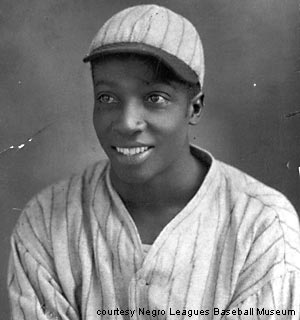|

1922-1946
St. Louis Stars, Kansas City Monarchs, Chicago American
Giants, Pittsburgh Crawfords, Homstead Grays
"So many people say I was born too early, but that's not
true - they opened the doors too late."
-James 'Cool Papa' Bell
Before Rickey there was Lou Brock, before Lou Brock there
was 'Cool Papa' Bell. Bell was the fastest man in the sport during his time. His speed evoked legendary tales that could not
be humanly possible. Satchell Paige claimed that Bell could shut off the light and be in bed before it got dark. Another common
myth pertaining to Bell is that he once hit a slow roller up the middle that got by the pitcher - it looked to be a base hit,
but Bell was called out when the batted ball hit him while sliding into second. While these tales may stretch the truth, there
is no doubt of 'Cool Papa's' greatness on the baseball diamond - here is his story.
James Thomas Bell was born to
a sharecropper on May 17, 1903 in Starkville, MS - a farming community of about 2,700. In 1920 at the age of 17, Bell ventured
north to St. Louis because "you could live better and make more money". It was in St. Louis that his baseball career began.
Bell caught on with a local semi pro team, the Compton Hill Club, which already had four of his brothers on its' roster.
After
spending two seasons playing semi pro ball as a knuckleball pitcher the Bell signed with the St. Louis Stars of the Negro
National League for $90 a month. It was as a Star that he gained his famous nickname. After the youngster calmly struck out
future Hall of Famer Oscar Charleston teammates labeled him 'cool' - the teams' manager Bill Gatewood added the 'papa' and
James Bell became 'Cool Papa' Bell.
Gatewood's influence on Bell extended beyond nicknames. Gatewood recognized Bell's
abilities and began playing him in the outfield when he was not pitching. Bell's unparalleled speed allowed him to play a
shallow center field where many would-be bloop hits turned into outs. He also taught Bell the art of switch hitting.
By
1924 the knuckleball pitcher was a full time center fielder and the Negro Leagues best lead off hitter. Bell's speed made
him the catalyst of the Stars offense. He was timed rounding the bases at a remarkable twelve seconds and was known to advance
from first to third on a bunt.
Bell remained in St. Louis for ten years. Led by Bell, SS Willie Wells, and 1B Mule
Settles the Stars won titles in 1929 and 1930. In 1931 the Negro National League disbanded because of financial problems and
Bell began his life as a baseball nomad, playing all over the continent.
During that era many Negro League players
headed south for the winter to play winter ball in the Caribbean. Lured by the warm weather, lack of racism, and large paydays
many black players found a second home in Latin America - Bell was no different. His winter ball career began on his honeymoon
to Cuba in 1928 after marrying Clara Belle Thompson. He became the first Cuban League player to hit 3 home runs in one game
and led the league in home runs and steals.
In the winter of 1937 Bell played in the Dominican Republic. He earned
his biggest payday, $450 per month playing in Mexico during the winters of 1938-41. In fact Bell became fluent in Spanish
after spending so much time south of the border.
Back in the States Bell spent six seasons (1933-38) with the Pittsburgh
Crawfords. He teamed up with Hall of Famers Josh Gibson, Oscar Charleston, Judy Johnson, and Satchell Paige to form one of
the greatest teams in baseball history. After leaving Pittsburgh Bell went to the Chicago American Giants and then to the
Homestead Grays in 1943 where he won three straight championships.
In 1948 with his best playing days behind him,
Bell was hired as a player/manager for one of the Kansas City Monarchs farm teams. While in that position he helped the growth
of many young ball players, including the future Mr. Cub, Ernie Banks. In 1951 the St. Louis Browns offered Bell a contract
to play in the major leagues. But at the age of 48 he declined saying he was too old to play at such a high level. Bell retired
from competitive baseball later that year.
Following his baseball career Bell found employment as a custodian at St.
Louis City Hall. He was eventually promoted to night watchman where he retired in 1973. In 1974 he was finally inducted into
the Baseball Hall of Fame becoming the fifth Negro Leaguer to receive the honor. His sunglasses and Stars uniform remain on
permanent display.
Bell spent the rest of his days living quietly in St. Louis. In 1987 Dickson Ave. was renamed James
'Cool Papa' Bell Ave in his honor. On March 7, 1991 'Cool Papa' Bell died after suffering a heart attack following his wife's
death in January. He and Clara were married 62 years and had a daughter, Connie.
Unfortunately no accurate statistics
were kept of 'Cool Papa' Bell's career, however it is believed that his career batting average was over .400. But statistics
alone could not possibly measure the greatness of Bell's career and the lasting influence he had on his sport.
-David Zingler,
December 2001
Simply Baseball Notebook
DISCLAIMER: All pictures are assumed to be in the public domain. No violation
of copyright is intended here. If one of the photos above is not in the public domain, please notify us and it will be removed.
|

